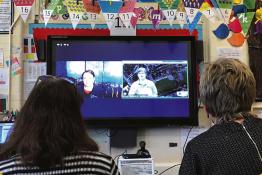The use of Web 2.0 technologies in school science
Issue 330 | Page 113 | Published Sep 2008
Description
Web 2.0 technologies can be defined as Web-based services or products that allow individuals to share digital resources with one another, to engage each other in conversation and to collaborate with one another so that they can collectively construct knowledge. This article discusses the potential uses of Web 2.0 technologies, for example RSS feeds, social bookmarking applications, blogs, podcasts, wikis and immersive virtual environments, to facilitate students' learning of science, especially in the 'long tail' region of science education outside the standard science curriculum.
More from this issue
This evaluation of a pilot GCSE course designed to enhance scientific literacy focuses on teaching How science works: how it relates to the '...
The discovery of the planet Neptune is presented as a case study for adding some useful history and philosophy of science to the science education...
Teachers are fascinated by neuroscience as they feel that it has the potential to improve their teaching practice. There were two main outcomes...



